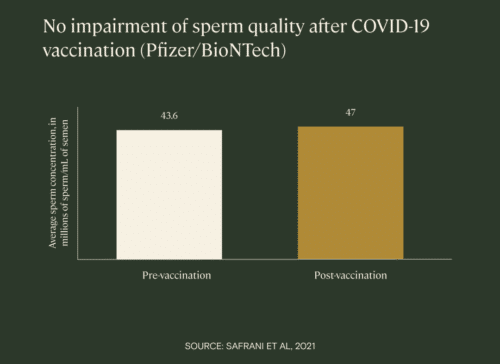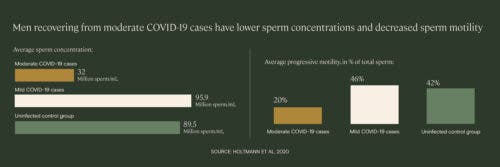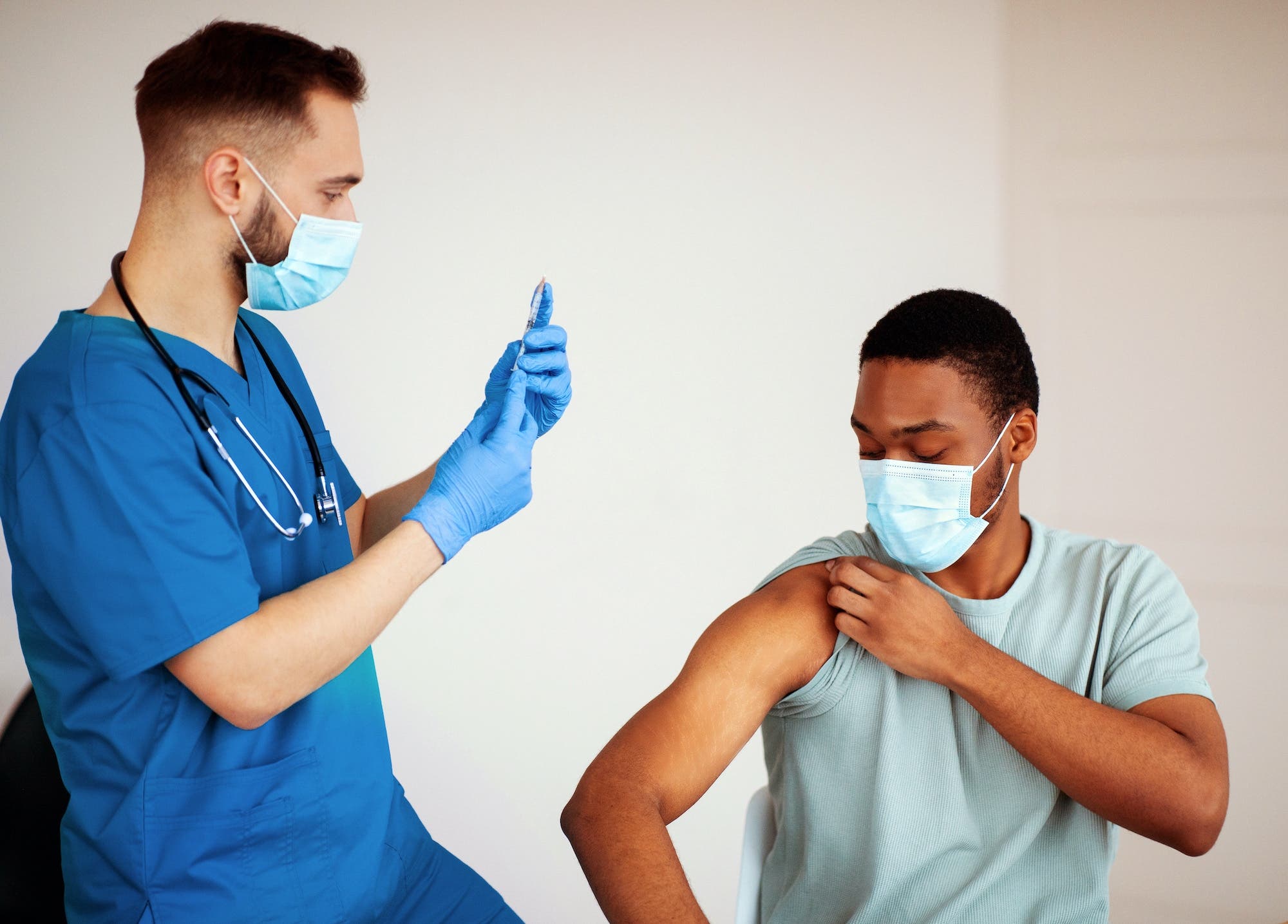UPDATED JULY 19, 2021
Here, we’ve gathered all the available data to help you make an informed decision. To summarize: the COVID-19 vaccines are safe and effective, and evidence demonstrates that they have no impact on sperm count or male fertility.
We will update this article as new research is completed.
Key takeaways:
- The COVID-19 vaccines will not alter male fertility; multiple studies demonstrate that being vaccinated has no effect on sperm count or motility.
- A COVID infection is known to impact fertility and sexual health, lowering sperm count and contributing to erectile dysfunction.
- Research demonstrates that everyone, including those hoping to conceive, should get vaccinated.
How do the COVID-19 vaccines work?
mRNA vaccines
Two of the COVID-19 vaccines currently approved for emergency use in the United States — the Pfizer vaccine and the Moderna vaccine — are mRNA vaccines. That means that, instead of using a piece of dead or weakened virus to trigger an immune response, like a typical vaccine, they contain messenger RNA, a piece of genetic code that can be “read” by your cells.
Once the vaccine is injected, the mRNA instructs your cells to create a protein that’s a lookalike for the spike protein on the outside of the novel coronavirus SARS-CoV-2. Though the spike protein by itself is harmless, your immune system will identify it as a foreign body and produce antibodies to destroy it. Then, if you’re exposed to SARS-CoV-2 in the future, your immune system will have the muscle memory to quickly destroy the virus before it makes you sick.
The spike protein and the mRNA used in the vaccine are both destroyed soon after they’ve served their purpose. The amazing thing about mRNA vaccines is that they can create an immune response without having to actually inject the virus, or any piece of it, into your body—making them extremely safe and effective.
Viral vector vaccines
The AstraZeneca COVID-19 vaccine, approved for use in Canada and parts of Europe, and the Janssen/Johnson & Johnson COVID-19 vaccine, approved for use in the US, are both viral vector vaccines.
Viral vector vaccines work in a similar manner to mRNA vaccines: they deliver genetic material to the cells that prompts them to create spike proteins, which then trigger an immune response. It’s the transportation that differs — viral vector vaccines use a different virus, such as a cold virus, to deliver the genetic material. The viral vector is modified so that it cannot replicate.
Do any of the COVID-19 vaccines affect male fertility?
Research on COVID-19 vaccines and male fertility
As of May 2021, we have evidence that the mRNA vaccines do not affect male fertility.
A study (still in preprint) of 43 male IVF patients at a hospital in Israel compared their semen parameters before and after receiving two doses of the Pfizer COVID-19 vaccine. Researchers found no decrease in sperm count or motility (the percentage of sperm that are “swimming”) after vaccination. This was true for men with and without male-factor infertility.

Another study, reported in JAMA in June, found similar results. This study, out of the University of Miami, examined the semen parameters of 45 healthy men before and after vaccination with a Pfizer or Moderna mRNA vaccine. Researchers found no decline in sperm count or motility, and no men became azoospermic — zero sperm count — after vaccination.
Sperm takes about 70 days to produce. This second study is important as it compared sperm tested before and 70 days after vaccination, encompassing an entire cycle of sperm production. This adds to the evidence provided by the earlier study, which examined semen parameters at an average of 33.6 days from the first dose of the Pfizer vaccine. Based on the evidence we now have, it does appear that COVID-19 vaccination affects short-term or long-term semen parameters.
The bigger picture
Initially, while organizations like the Society for Male Fertility and Urology and the Society for the Study of Male Reproduction were not concerned about long-term effects of the COVID-19 vaccine on male fertility, they did warn about the possibility of a short-term impact on sperm count after the COVID-19 vaccine due to fever.
About 16% of vaccine recipients experience a mild-moderate fever. We know from studies on influenza and other febrile (fever-causing) illnesses that a fever can cause a temporary drop in sperm production. However, the studies explored above do not demonstrate any effect of fever on sperm count or motility.
While these parameters are correlated with your likelihood of conception, they are imperfect predictors of fertility. The studies above are small, and don’t look at sperm morphology (the percentage of sperm that are the proper shape and structure) or genetic health (sperm DNA fragmentation). Nonetheless, they add to the bank of scientific knowledge that reassures us that COVID-19 vaccination will not impact male fertility.
We don’t yet have specific data on the effect of the viral vector vaccines on male fertility. Thankfully, the way that these vaccines work doesn’t raise any red flags. In fact, vaccination can be considered protective, since we know that COVID-19 itself has some serious impacts on male fertility.
Will the COVID-19 vaccine change my sperm DNA?
No. The Pfizer and Moderna COVID-19 vaccines contain messenger RNA, which is physically and chemically different from DNA. DNA is two inter-coiled strands made up of four bases (the “double helix”), while RNA is a single strand made up of a different combination of bases. RNA’s function in the body is to carry instructions to create proteins, as it does in the case of this vaccine—it creates a lookalike for the COVID-19 “spike” protein. RNA does not change your cells’ genetic material, which is securely housed in the cell nucleus.
The synthetic messenger RNA in the vaccines does not enter the nucleus of your cells, nor is it possible for it to incorporate into your genome. Your cells break down and dispose of the RNA strand soon after it’s injected. So the mRNA vaccines will not impact the DNA inside your sperm, or DNA in any of the other cells in your body.
What can impact the DNA inside your sperm is illness, such as COVID-19 or influenza, along with smoking, chemical or toxin exposure, and paternal age. Damage to the DNA inside your sperm is known as sperm DNA fragmentation.
Should I get the COVID-19 vaccine if my partner and I are trying to conceive?
The Society for Male Reproduction and Urology (SMRU) and the Society for the Study of Male Reproduction (SSMR), two major male fertility medical organizations, are both recommending that the COVID-19 vaccine should be offered to men desiring fertility when they meet the criteria for vaccination. Similarly, ASRM has issued guidance that patients who are trying to conceive or going through fertility treatments should be encouraged to receive the vaccine.
The mRNA vaccines do not appear to affect sperm count or motility, so vaccination should not impact the outcomes of fertility treatment. However, if you and your partner are undergoing fertility treatment, you may want to talk to your doctor about timing, so that the potential impact — however small — of fever post-vaccination won’t affect your cycle.
Does COVID-19 affect male fertility?
All signs point to yes, COVID-19 has a significant impact on male fertility — at least temporarily. In one study, moderate cases of COVID-19 were associated with drops in average sperm concentrations by two-thirds compared to healthy men, and drops in average motility of one-half. Additionally, researchers from as Israeli medical center report that patients with moderate COVID-19 symptoms have a 50% reduction in semen volume, sperm concentration, and sperm motility 30 days post-diagnosis.
While we don’t have enough data yet to say if the effect is long-term, we do know that the coronavirus can infect the testicles, and that cases of orchitis — painful inflammation of the testes that can cause permanent fertility issues — have been identified among COVID patients.
So, it’s not inaccurate to say that the COVID-19 vaccine may actually protect against infertility by providing a high level of protection against COVID-19.

What can I do to protect my fertility? Should I freeze my sperm before getting the COVID-19 vaccination?
There is no scientific or medical reason to freeze your sperm before vaccination. However, we are huge proponents of freezing your sperm as a way to preserve your fertility, regardless of age, illness, injury, or anything else that comes your way.
Sperm freezing is a simple procedure, and the at-home kit offered by Legacy makes it even easier. Here’s what the process looks like for Legacy clients:
- Order a kit for delivery. Our For Tomorrow and Forever packages include sperm freezing, but For Today clients will also have the option to freeze after reviewing their results.
- Produce a semen sample via masturbation in the comfort of your own home. Then, mix the sample with the preservation media to keep it stable during shipping. Schedule a pick-up to transport the kit back to our lab.
- You’ll receive a comprehensive, clinic-grade report on your sperm health, including count, motility (movement), and morphology (shape). Learn more in our Guide to Sperm Testing.
- We also perform an important test called a “post-thaw analysis,” in which sperm is frozen, thawed, and evaluated to understand how many sperm cells survived and the motility of the sample after thawing.
- If your sperm passes the post-thaw analysis, you have the option to freeze it long-term. Once frozen, sperm can be stored indefinitely with no loss in quality. Thawed sperm can be used in an insemination or an IVF cycle.
Once you freeze your sperm, your fertility is protected against illnesses, accidents, the genetic risks of being an older father, and any other threat—even those we may not know about yet.
Learn more about sperm freezing.
References
- The Center for Disease Control. “Understanding mRNA COVID-19 vaccines.” 2020.
- Myriam Safrani et al. “BNT162b2 mRNA Covid-19 vaccine does not impair sperm parameters.” Pre-print, 2021.
- Daniel C. Gonzalez et al. “Sperm Parameters Before and After COVID-19 mRNA Vaccination.” JAMA, 2021.
- Editorial Office, American Society for Reproductive Medicine. “COVID-19 vaccine and infertility: baseless claims and unfounded social media panic.” Fertility & Sterility, 2021.
- Society for Male Reproduction and Urology and the Society for the Study of Male Reproduction. “Joint Statement Regarding COVID-19 Vaccine in Men Desiring Fertility from the Society for Male Reproduction and Urology (SMRU) and the Society for the Study of Male Reproduction (SSMR).” 2021.
- Ranjith Ramasamy, MD. “COVID-19 Vaccine and Impact on Fertility Study.” Ongoing research, 2021.
- American Society for Reproductive Medicine Coronavirus/COVID-19 Task Force. “American Society for Reproductive Medicine (ASRM) Patient Management and Clinical Recommendations During the Coronavirus (COVID-19 Pandemic, Update No. 11: COVID-19 Vaccination.” 2020.
- Nora Holtmann, MD et al. “Assessment of SARS-CoV-2 in human semen—a cohort study.” Fertility & Sterility, 2020.
- Dan Aderka et al. “COVID-19 may harm sperm production.” Unpublished research reported via BioNews, 2020.
- Justin K. Achua et al. “Histopathology and Ultrastructural Findings of Fatal COVID-19 Infections on Testis.” World Journal of Men’s Health, 2020.
- Hassan Alkhatatbeh et al. “Does severe acute respiratory syndrome coronavirus-2 (SARS-CoV-2) cause orchitis in patients with coronavirus disease 2019 (COVID-19)?” Arab Journal of Urology, 2020.



